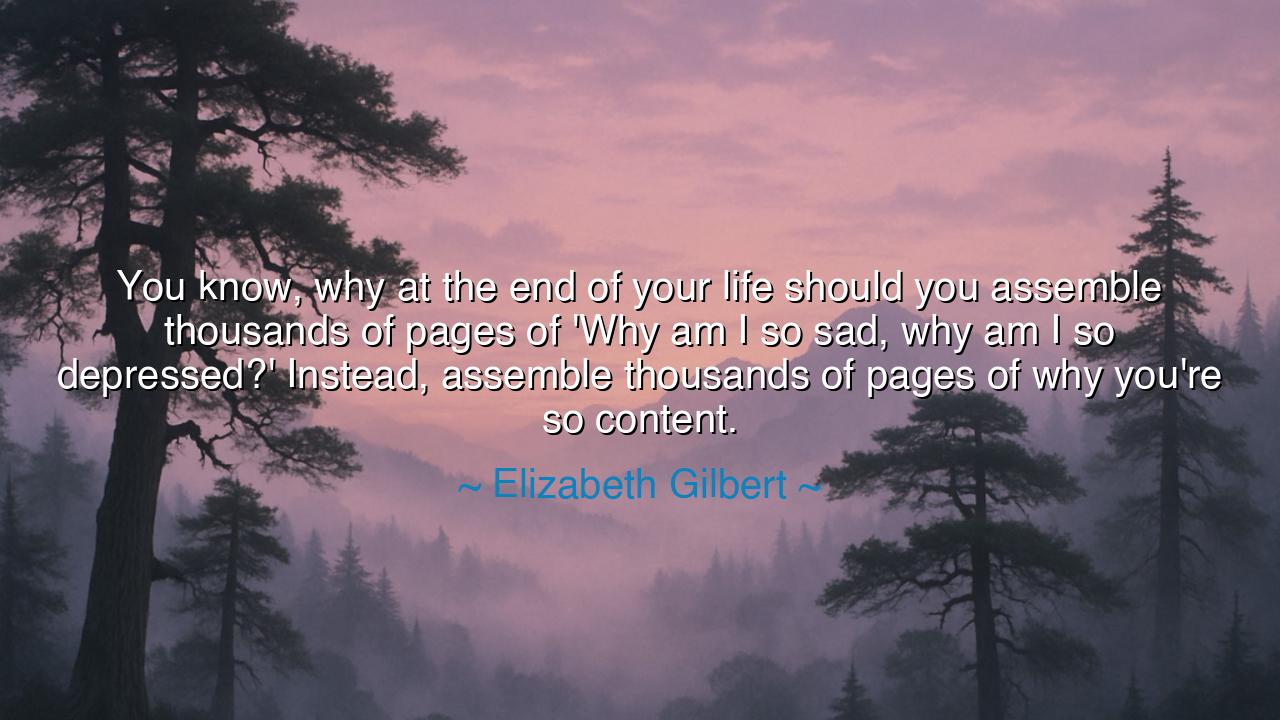
You know, why at the end of your life should you assemble
You know, why at the end of your life should you assemble thousands of pages of 'Why am I so sad, why am I so depressed?' Instead, assemble thousands of pages of why you're so content.






The words of Elizabeth Gilbert strike with the force of a gentle yet profound reminder: “You know, why at the end of your life should you assemble thousands of pages of ‘Why am I so sad, why am I so depressed?’ Instead, assemble thousands of pages of why you’re so content.” In these words, there is both a warning and a blessing. For Gilbert calls us to consider what story we are writing with our days. Every thought, every memory, every reflection becomes a page in the book of our existence. Shall it be filled with lament, or with gratitude? That choice lies within our hands.
The ancients knew this truth well. Marcus Aurelius, emperor and philosopher, wrote his Meditations not as a record of his despair, but as a practice of shaping his soul toward virtue and peace. Though he carried the burdens of empire and endured wars, betrayals, and sickness, his pages are filled not with endless cries of sorrow, but with reminders of beauty, wisdom, and acceptance. He could have written “Why am I so weary?” a thousand times, but instead he assembled a legacy of strength and serenity. Gilbert’s words echo this ancient discipline: to write the script of your life with contentment rather than sorrow.
The meaning of her quote also speaks to the nature of memory. What we dwell on in life becomes the fabric of how we are remembered, not only by others but by ourselves. The sad and the depressed moments are real, yet they need not be our defining record. By turning our attention to gratitude, to joy, to even the smallest reasons for contentment, we build a treasury of light that can outshine the darkest nights. For what is a life, if not the sum of the moments we choose to keep?
History gives us the example of Viktor Frankl, who endured the horrors of the concentration camps. Surrounded by despair, he might have written endless pages of grief, and who would have blamed him? Yet he chose instead to reflect on meaning, hope, and the strength of the spirit. His book Man’s Search for Meaning became not a record of endless sadness, but a testimony to the power of finding purpose even in suffering. Frankl shows us, as Gilbert reminds, that though sorrow is part of life, we can still decide what story to assemble from it.
There is also a heroic call in Gilbert’s words. To focus only on despair is easy, for pain always clamors loudly. But to gather reasons for contentment requires courage, discipline, and vision. It means seeing joy in a friend’s laughter, gratitude in a simple meal, beauty in the turning of seasons. To live this way is not denial of suffering, but defiance against despair. It is the strength to say: “Yes, the darkness exists—but I will not make it my monument.”
The lesson for us is this: do not let sorrow become your life’s journal. Honor your struggles, but do not worship them. Instead, make it your practice to notice what brings you peace, what stirs gratitude, what lifts your spirit. For in the end, when the final pages of your life are turned, it is far nobler to hold a book filled with light than with shadows. Gilbert calls us to build such a book, not in ink alone, but in the choices we make every day.
Practical action is clear: begin now to assemble your record of joy. Write down each day a small note of what made you grateful, what gave you strength, what filled you with warmth. Speak words of appreciation aloud, so that others may hear them and be lifted. And when sorrow comes, acknowledge it, but do not let it consume the scroll of your life. In time, you will discover that the habit of gratitude becomes a fortress, protecting your soul from despair.
So let us remember Gilbert’s wisdom: at the end of life, let your story be one of contentment, not endless cries of grief. Write not thousands of pages of “Why am I so sad?” but thousands of reasons why life was worth living. In this, you will leave behind not only memories for others, but peace for yourself. And what greater legacy could there be, than to depart this world with a heart full of joy and a book filled with light?






AAdministratorAdministrator
Welcome, honored guests. Please leave a comment, we will respond soon